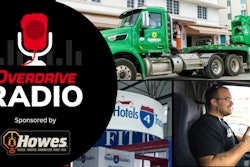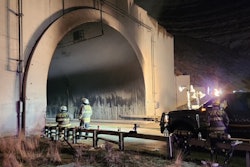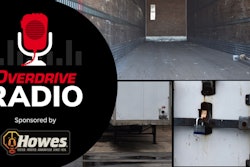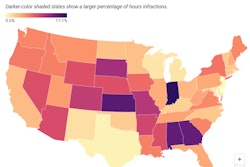 Overhaul
Overhaul
A truck carrying a high-value load of electronics got boxed in by passenger vehicles and robbed at a railroad crossing in broad daylight in Chicago last week. That's according to Overhaul, a security tech provider that monitors cargo theft events.
Overhaul said while this kind of brazen theft is common in other countries, it could mark the beginning of a "worrying trend" to see it happen in a major U.S. city.
The theft happened in the early afternoon of Friday, February 21, after a driver hauling a load of consumer electronics had just departed origin in Chicago. At a railroad crossing, several passenger vehicles, including what looks like a rented van, boxed in the truck.
[Related: Thieves target in-transit cargo while the truck moves]
"While stopped, multiple actors in several other passenger vehicles cut the seals (including a high security bar seal) and began to pilfer the load," Overhaul wrote in a release describing the incident. "This event took place in broad daylight on a populated road with multiple witnesses."
The driver, in this case, did manage to take some action by getting a few pictures of the thieves. Truck drivers, often, serve as the best line of defense against cargo theft, according to experts.

 Overhaul
Overhaul
Overhaul "has been warning about the anecdotal increases in violence and driver confrontation in the commission of cargo theft," the company wrote. "This incident highlights that worrying trend in a way not seen until now in the U.S. This M.O. is something usually seen in areas with much higher violence in the commission of cargo theft, such as Mexico and Brazil."
Chicago has been a known hot spot for cargo theft via "straight theft" like the smash and grab seen in the pictures above, likewise "strategic theft," or double brokering and/or business impersonation events that lead to missing loads. Late last summer, one owner-operator went to jail for his unwitting participation in a cargo theft scheme stemming from him simply picking up and dropping a load his carrier booked via a broker.
[Related: Do truckers deserve blame for getting double brokered?]
Cargo theft expert Scott Cornell, after a high profile egg heist in Pennsylvania, said that for the most part, criminals already have a buyer lined up for stolen cargo.
"Local criminals are aware of which products move through different facilities, which provides them with targets for this method of pilferage as well," wrote Overhaul, referencing the recent Chicago incident. Typically, cargo theft in Chicago has "traditionally been from rail or striking OTR shipments as they were parked overnight outside of receiving facilities of known products." Overhaul recommended shippers in the Chicago area and near other intermodal hubs "be vigilant for signs of surveillance at all origin locations."
For drivers "should stay alert for any indications of being followed out of the origin," Overhaul said. If it looks like you're being followed, wait to depart until someone can investigate. "If a driver suspects they are being followed directly from departure, they should maintain contact with their dispatch as they attempt to return to the origin facility or enter the highway, whichever is closest. ... Pulling into a police station is an excellent option if available. If possible, routes departing origin in Chicago should avoid areas that will force a stop before entering the highway." Areas like that rail crossing.
Overhaul recently launched FraudWatch, a "carrier vetting" and anti-cargo theft platform that hopes to curb these events working with shippers and utilizing onboard tracking devices, likewise close work with law enforcement agencies. But vetting logistics partners only takes you so far -- criminals can strike at any time.
Overhaul recommends shipments in big hubs like Chicago not to stage otuside of delivery locations or in nearby industrial areas, like Lamar Boulevard in Memphis, Tennessee, or Fulton Industrial in Atlanta, "as criminals often operate in these areas as well."
[Related: Owner-op jailed after unwitting participation in cargo theft: Cautionary tale, mitigating risk]










